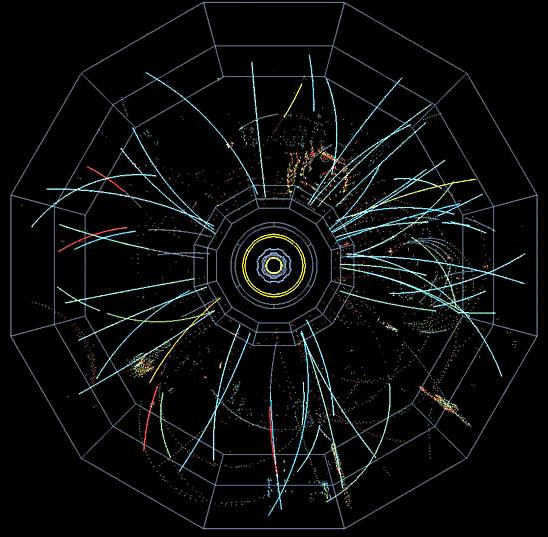As physicists built bigger and more ambitious machines,
随着物理学家建造越来越大、越来越雄心勃勃的机器,
they began to find or postulate particles or particle families seemingly without number:
他们开始或推断出似乎永无穷尽的粒子或粒子族:
muons, pions, hyperons, mesons, K-mesons, Higgs bosons, intermediate vector bosons, baryons, tachyons.
π介子、μ介子、超子、介子、K介子、希格斯玻色子、中间矢量玻色子、重子、超光速粒子。
Even physicists began to grow a little uncomfortable.
连物理学家都开始觉得不大舒服。
"Young man," Enrico Fermi replied when a student asked him the name of a particular particle,
“年轻人,”当有个学生问恩里科·费米某个粒子的名字的时候,他回答说,
"if I could remember the names of these particles, I would have been a botanist."
“要是我记得清这些粒子的名字,那我就成了植物学家了。”
Today accelerators have names that sound like something Flash Gordon would use in battle:
今天,加速器的名字听上去有点像是弗莱什·戈登用于打仗的武器:
the Super Proton Synchrotron, the Large Electron-Positron Collider, the Large Hadron Collider, the Relativistic Heavy Ion Collider.
超级质子同步加速器呀,大型正负电子对撞机呀,大型强子对撞机呀,相对论性重离子对撞机呀。

Using huge amounts of energy
使用的能量是如此之大
(some operate only at night so that people in neighboring towns don't have to witness their lights fading when the apparatus is fired up),
(有的只能在夜间操作,这样,设备点火时邻近城镇的居民才不至于注意到自己的灯光暗淡下去),
they can whip particles into such a state of liveliness that a single electron can do forty-seven thousand laps around a four-mile tunnel in a second.
它们可以把粒子激活到这样的状态:一个电子在不到1秒的时间里能沿着7公里长的隧道击打47000圈。
Fears have been raised that in their enthusiasm scientists might inadvertently create a black hole or even something called "strange quarks,"
人们担心,科学家们在头脑发热的时候会在无意之中创建一个黑洞,甚至所谓的“奇异夸克”。
which could, theoretically, interact with other subatomic particles and propagate uncontrollably.
从理论上说,这些粒子可以与别的亚原子粒子相互作用,产生连锁反应,完全失去控制。
If you are reading this, that hasn't happened.
要是你现在还活着在看这本书的话,说明那种情况没有发生。
Finding particles takes a certain amount of concentration.
寻找粒子需要集中一定精力。
They are not just tiny and swift but also often tantalizingly evanescent.
粒子不但个儿很小,速度很快,而且转瞬即逝。












